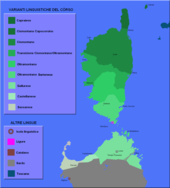Insular Romance languages
The Insular Romance Languages (Ethnologue: Southern Romance Languages) is a family of Romance languages that includes mainly Sardinian and, according to some authors, Sassarese, African Romance and Old Corsican. For some Romanists they form an independent branch of Western Romance and Eastern Romance, while others include them in the Western Romance languages.
Other classifications, such as those of Ethnologue and Glottolog, include the privateering within this group. They also classify Sardinian as a macrolanguage that includes Sassaric and Galluric as dialects. Modern Corsican and Sardinian do not form a valid phylogenetic group, it is possible that Old Sardinian and Old Corsican were related, but Sardinian ancient Corsican is very poorly documented.
History
Corsica and Sardinia, together, constituted a province (Corsica et Sardinia) of the Roman Republic (and the subsequent Empire), from the year 238 BC. C., after the first Punic war. Despite this early incorporation, in many areas of the two islands the Romanization was slow. Seneca, who lived in exile in Corsica for 8 years, between 41 AD. C. and 49 d. C., explains that Latin was only spoken in the Roman colonies and that the native population spoke other language(s) that he could not understand.
However, the remarkable isolation of these two islands led to the development of Romance variants unrelated to the dialects of any other part of Romania.
Classification
For Ethnologue and Glottolog, Sardinian and Southern Corsican form a phylogenetic group, due to their shared vocalism, but it cannot be traced back to a proto-Corsican-Sardinian language and, in fact, they constitute languages belonging to two different groups, despite of the coincidences. Due to the lack of linguistic evolution it is more likely that the vocalism shared by these languages is derived independently by reduction of Eastern Romance vowels or Western Romance vowels, losing open vowels and diphthongs. Many Romanists argue that modern Corsican and Galluric are not related to Sardinian, but are the result of a particular evolution of the Old Tuscan dialect that was influenced by Old Corsican (this was probably related to Sardinian), the Gallo-Italic languages, and Sardinian. Substratum influence and convergence would explain some common archaisms. This is supported by the fact that Corsican and Gallures phonologically and grammatically share their main features with the Italo-Romance languages, which is why they belong to that group and are part of the Tuscan varieties.
Phonologically and grammatically, without a doubt, Sardinian shares its main features with Western Romance languages, specifically with Ibero-Romance languages, such as the voicing and fricativization of the voiceless Latin plosives [p], [t], [k ] (unlike Iberro-Romance languages, this phenomenon also affects initial consonants, e.g.: tempus ['tempuzu] 'tiempo' but su tempus [su'ðempuzu] 'the time'), the palatalization or sonorization of the intervocalic group -cl and the plurals in -s. There is also deletion of initial consonants and shares with the Ibero-Romance, Occitan-Romance and Mozarabic languages the betacism of -v.
The Sassarés language, also spoken in Sardinia, has the features of Western Romance such as voicing or loss of voiceless plosives, voicing also affects initial consonants and even scientific terms or names of sciences such as in Gallo-Italic, palatalization of the group - cl intervocalic and the use of the plural (-s) only in the accusative in the other cases it uses (-e, -i). Sassarese from one point of view seems to be a transitional variant between Sardinian and Corsican. Sassarese may have been a historical variety of Sardinian that underwent a similar evolution to the Gallo-Iberian group and a strong Tuscan influence.
That is why some Romance scholars consider the insular branch as a group of Western Romance languages.
It has also been proposed that the Insular Romance languages comprise the extinct African Romance and Old Corsican spoken before the Tuscanization of the island. African Romance shares with Sardinian the closed vocalism that does not distinguish between the short and long vowels of Latin, in addition to other characteristics such as the lack of palatalization, the plurals in -s, the voicing of the intervocalic voiceless plosives that also affects the initials, degemination and betacism of -v.
On the other hand, Sardinian and African Romance have some characteristics that are unique to Romance languages, which set them apart from the Gallo-Iberian group (true Western Romance) and Eastern Romance:
- Conservation of the Latin groups (-ci and -ce) with their original pronunciation -k (only at the beginning of the words), within the words they are smiled passing to -g. However, the lack of palatalization was also present in the Dalmatian belonging to the Eastern Romance languages and the Balkan languages such as the Arrumano have only semi-palatalizations.
- Conservation of the i and the u briefs of Latin, which in the other Roman languages became e and, thus, losing the difference between i/e and u/or. In that aspect of the bells it is considered that the Sardinian is the most conservative current romance language since the rest of the Romance languages altered their bells according to the vocálica quantity, and only the Sardinian retained in all cases the original bell. However, this vocalism is also present in the corso and southern lucano, which is why they are grouped, but because of the lack of linguistic evolutions it is more likely that the vocalism shared by these languages is derived independently by a reduction of Eastern romance vocalism or Western romance vocalism, losing open vowels and diptongos.
| Classical Latin | . | | Œ | . | . | ♫ | . | AU | Å | | ♫ | |||
|---|---|---|---|---|---|---|---|---|---|---|---|---|---|---|
| Insular Romance | ♪ | ♪ | ♪ | ♪ | ♪ | |||||||||
Gallery
 |  |
| Language Map of Sardinia | Corsica linguistic map |
Contenido relacionado
Algerian languages
Panocho
Albanian language